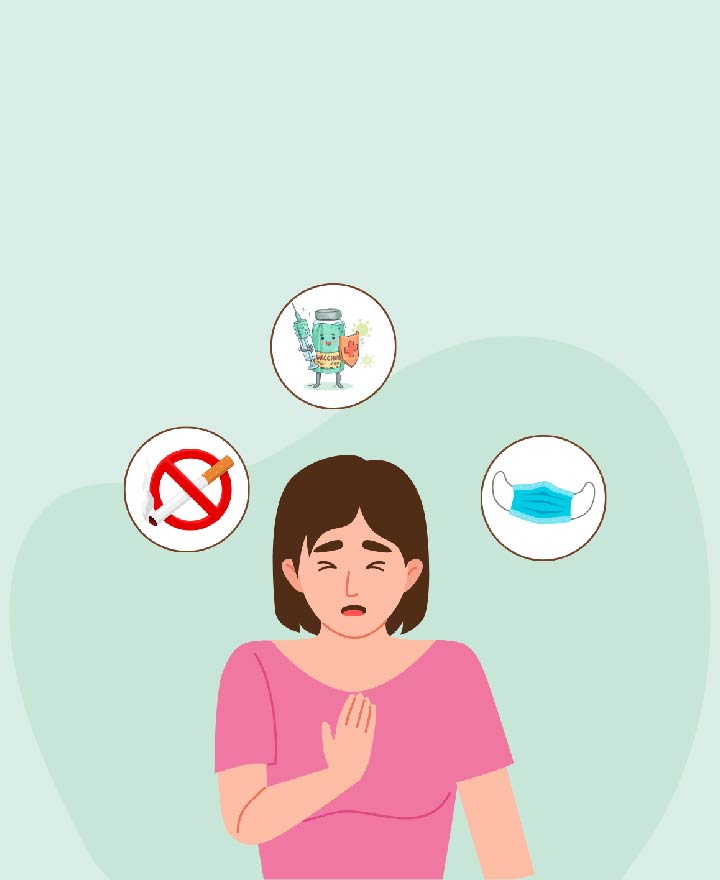

Oral Thrush: Causes, Symptoms, Treatment
Oral thrush, or oral candidiasis, occurs when there is an overgrowth of the Candida albicans fungus in the mouth. Thrush can often be prevented by maintaining proper oral hygiene. However, if the symptoms persist, it is important to seek medical attention as when left untreated, the infection can spread to the oesophagus and bloodstream, leading to serious health complications. Read on to know more about this condition.
What Is Thrush?
When there is an overgrowth of the candida fungus, a yeast, in your mouth, it can lead to the formation of thick and creamy white patches all over your tongue. This condition is classified as oral thrush, also known as oral candidiasis. Candida albicans is naturally present in the mouth in small amounts. However, problems arise when its growth exceeds normal levels. Individuals with weakened immune systems, infants and people with chronic illnesses are more susceptible to thrush. Thrush is usually harmless and can often be treated effectively with simple home remedies or antifungal medications.
Causes
The main triggers of oral thrush are:
• Taking certain antibiotics, birth control pills or steroids
• Sexually transmitted diseases like HIV and AIDS
• Weak Immune System
• Transmission from one person to another through saliva (for example, when you kiss an infected person or baby)
Thrush is also common among breastfeeding mothers and their babies. Infants are especially prone to oral thrush due to their immature immune systems. If a baby develops thrush, it can be passed to the mother during breastfeeding, leading to nipple thrush. This may cause soreness, itching, redness or flaking of the nipple and areola.
Thrush Symptoms
Here are some of the early oral thrush symptoms you should be aware of to get it treated on time:
• Thick red or white patches in your mouth, especially on the tongue, inner cheeks and throat
• Angular cheilitis (cracking or redness near the corners of the mouth)
• A cottony or dry feeling in the mouth
• Loss of sense of taste
• Difficulty eating or swallowing due to soreness or a burning sensation in your mouth
• Inflammation in the areas under the dentures
Diagnosis
Usually, your doctor will be able to confirm if you have oral thrush or not when they take a close look at the white patches inside your mouth. The diagnostic procedures involved here are:
• A small sample of your white lesions is tested in the lab to confirm the condition of thrush and rule out other oral ailments.
• In severe cases of infections, where the condition spreads to the oesophagus, tests like throat culture, endoscopies and X-rays are taken to confirm the severity of the infections.
Treatment
In most cases, thrush can be easily treated in people with healthy immune systems. You may need medical help only when you have a weak immune system or if you are diagnosed with a serious underlying issue. Antifungal medications can help to treat thrush within a week or a fortnight, depending on the extent of the yeast infection.
Home Remedies
When you notice oral candidiasis symptoms, you can follow these home remedies to keep yeast infections causing thrush at bay:
• Rinsing your mouth regularly with a saltwater solution. Instead of salt, you can also use baking soda or apple cider vinegar
• Including good quality probiotics (yoghurt, kefir, kombucha, etc.) in your regular meals
• Disinfecting your dentures regularly
• Practicing proper oral hygiene by properly brushing and flossing your teeth
Some remedies you can try to prevent thrush in babies are:
• Properly cleaning and sterilising their feeding bottles and pacifiers
• Cleaning your breasts with water after every feed schedule
• Limiting your feeding sessions to about 20 minutes to avoid irritations and sores in the baby’s mouth
• Keeping your baby well-hydrated
Risk Factors
Certain health conditions and lifestyle factors can increase the risk of developing oral thrush, including:
• Uncontrolled diabetes, cancer or certain chronic conditions
• Medical treatments like chemotherapy and radiation
• Recent organ transplant
• Usage of dentures
• Excessive smoking
• Yeast infections in the vagina
• Certain medications (antibiotics, corticosteroids, etc.)
• Weakened immune system
Complications
In rare cases, when thrush is left untreated for a long time, it can lead to some complications, such as:
• The candida fungus can enter the bloodstream and spread to vital organs, potentially affecting the brain, heart, or other parts of the body
• In severe cases, it can lead to septic shock, a serious condition where blood pressure drops to dangerously low levels.
• Oral thrush can also worsen existing health conditions, especially in people who are already battling serious illnesses like cancer or HIV/AIDS or those recovering from an organ transplant.
Prevention
Here are some preventive measures you can try to reduce your risk of thrush and maintain proper dental health:
• Basic oral hygiene with regular brushing and flossing
• Regular dental health checks, especially if you use dentures
• Stop excessive usage of mouthwashes
• Avoid high-sugar and high-yeast foods
• Avoid smoking and using tobacco-based products
• Maintain dentures properly
• Treating oral problems like angular cheilitis, dry mouth, mouth sores, etc. in the initial stages itself
• Seeking immediate medical help for vaginal yeast infections
Conclusion
Oral thrush is a common mouth ailment found in babies, older people and people with weak immune systems. In most cases, doesn’t lead to any health complications. Proper oral hygiene, regular dental checks and antifungal medicines are enough to manage the symptoms.
In the rare cases that thrush spreads to the oesophagus or enters the bloodstream, it can impact vital organs like the brain and heart. Such complications can lead to extended medical care and higher treatment costs. Having a reliable health insurance plan in place can provide financial support and peace of mind should unexpected health issues arise.
One of the important components of our overall wellness is also being financially secured. Healthcare emergencies can happen any time, but a good health insurance policy can protect you from such uncertain situations. To know more about Wellness and other health related tips, visit the wellness corner.
Source: nhs.uk, webmd, my.clevelandclinic.org
Disclaimer: This blog provides general information and discussions about health and related subjects. The information and other content provided in this blog, website or any linked materials are not intended and should not be considered or used as a substitute for medical advice, diagnosis, or treatment. Kindly contact your doctor before starting a new medicine or health regime.
Related Articles
Causes of Gingivitis- Understanding Oral Health
Mouth Ulcers - Causes, Symptoms & Treatment
Identifying the Symptoms of Gingivitis
A Guide To Healthy Teeth And Gums For Adults And Children
Common Tooth Problems in Babies and Their Effective Solutions
Published on July 10, 2025















 Health Insurance
Health Insurance  Travel Insurance
Travel Insurance  Car Insurance
Car Insurance  Cyber Insurance
Cyber Insurance  Critical Illness Insurance
Critical Illness Insurance
 Pet Insurance
Pet Insurance
 Bike/Two Wheeler Insurance
Bike/Two Wheeler Insurance  Home Insurance
Home Insurance  Third Party Vehicle Ins.
Third Party Vehicle Ins.  Tractor Insurance
Tractor Insurance  Goods Carrying Vehicle Ins.
Goods Carrying Vehicle Ins.  Passenger Carrying Vehicle Ins.
Passenger Carrying Vehicle Ins.  Compulsory Personal Accident Insurance
Compulsory Personal Accident Insurance  Travel Insurance
Travel Insurance  Rural
Rural